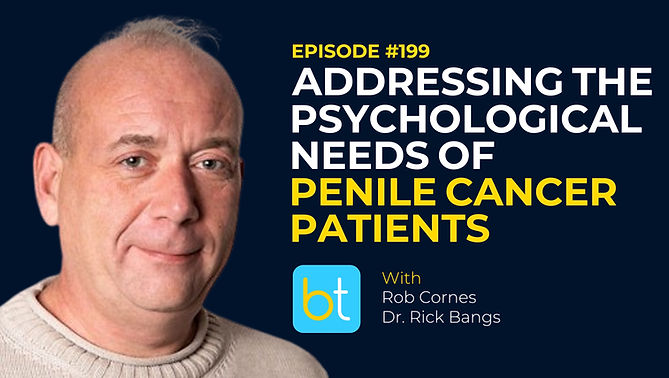BackTable / Urology / Podcast / Episode #199
Addressing Isolation & The Psychosocial Needs of Penile Cancer Patients
with Rob Cornes and Dr. Rick Bangs
How do you care for patients with penile cancer? As urologists, we’re trained to think about diagnosis and treatment, but how can we help manage the psychological impacts of penile cancer? In this episode of BackTable Urology, host Dr. Ben Ayres, a urologic oncologist specializing in penile cancer, discusses the unique psychological challenges faced by penile cancer patients with bladder cancer survivor Dr. Rick Bangs and nurse Rob Cornes.
This podcast is supported by:
Be part of the conversation. Put your sponsored messaging on this episode. Learn how.

BackTable, LLC (Producer). (2024, November 12). Ep. 199 – Addressing Isolation & The Psychosocial Needs of Penile Cancer Patients [Audio podcast]. Retrieved from https://www.backtable.com
Stay Up To Date
Follow:
Subscribe:
Sign Up:
Podcast Contributors
Rob Cornes
Rob Cornes is a male cancer information nurse specialist.
Dr. Rick Bangs
Dr. Rick Bangs is the host of the Bladder Cancer Matters Podcast.
Dr. Ben Aryes
Dr. Ben Aryes is a urologist at St. George's University of London in London, England.
Synopsis
This episode emphasizes the importance of awareness and peer support in reducing isolation and stigma associated with penile cancer. The conversation also explores the role of multidisciplinary care and the benefits of holistic approaches to patient decision-making.
Timestamps
00:00 - Introduction
04:05 - Isolation in Penile Cancer
06:38 - The Role of Advocacy and Peer Support
15:29 - Shared Decision Making in Penile Cancer Care
23:22 - Value of Multidisciplinary Care
Resources
Photocure
https://www.photocure.com/
Global Society of Rare GU Tumors (GSRGT)
https://www.gsrgt.com
Disclaimer: The Materials available on BackTable.com are for informational and educational purposes only and are not a substitute for the professional judgment of a healthcare professional in diagnosing and treating patients. The opinions expressed by participants of the BackTable Podcast belong solely to the participants, and do not necessarily reflect the views of BackTable.












